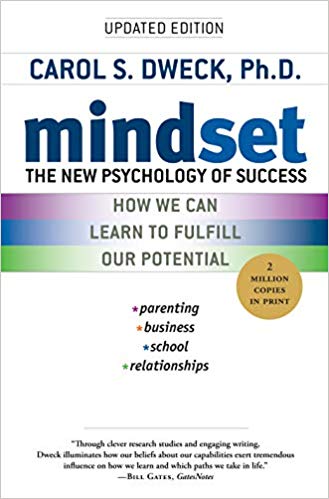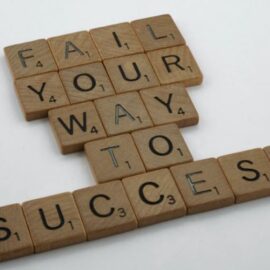

This article is an excerpt from the Shortform summary of "Mindset" by Carol Dweck. Shortform has the world's best summaries of books you should be reading.
Like this article? Sign up for a free trial here .
What is low-effort syndrome? Do you have it? How do you combat it?
Low-effort syndrome is the tendency to put in minimal or no effort at school, in sports, or in life. This may be due to a belief that you’re being discriminated against and can’t win in a rigged system, or it may be due to a fixed mindset and the belief that you if perfection isn’t guaranteed, you shouldn’t try at all.
We’ll cover what low-effort syndrome is and how to work against it and develop a growth mindset.
What Is Low-Effort Syndrome?
When you start out in life, success is about learning. You’re born with a drive to learn. Babies learn and stretch themselves every day. They don’t worry about failing or quit. For instance, they don’t decide walking is too hard and give up or fear falling. They just keep trying.
As early as preschool age, however, children develop mindsets or beliefs about their ability. Fixed mindsets slow or shut down the intense drive to learn. Some children become fearful of not being seen as smart; they begin rejecting challenges. This is low-effort syndrome. Others, with a growth mindset, embrace challenges and relish becoming smarter. Fixed mindset children become non-learners.
Low-Effort Syndrome Example: College Classes
At the University of Hong Kong, everything is taught and learned in English, which means strong English skills are essential to a student’s academic success. Students have varying English skills when they arrive. Researchers measured incoming students’ mindsets, then asked those with poor English skills whether they would take a course to improve their English if it were offered. Fixed-mindset students weren’t interested, while growth-mindset students said “yes” enthusiastically. The fixed-mindset students were willing to risk their academic careers for the short-term value of seeming smart. This is indicative of low-effort syndrome.
Over time, people with fixed mindsets and growth mindsets come to view the nature of success differently.
- Fixed-minded people avoid challenges because they want to feel smart and in control. In contrast, growth-minded people thrive on challenge and stretch themselves past their comfort zone.
- Fixed-minded people care about perfection. To feel smart, they not only have to “get it” right away, they have to be perfect at it. If they’re not, they stop trying (low-effort syndrome). In contrast, growth-minded people said they felt smart when they tried hard and made progress or were able to do something they couldn’t do before. Feeling smart was about learning.
- Fixed-minded people expect to immediately perform at high levels, without the need to learn. They don’t allow themselves time to develop or become. As a result, they get frustrated by failure and give up early. In contrast, growth-minded people expect to need to put in lots of time and effort to get better at things, and are thus more resistant to failure.
- Fixed-minded people prefer to be validated by others as capable, to be seen as geniuses. In contrast, growth-minded people aren’t afraid to acknowledge a need to learn through questioning and receiving critical feedback.
Low-Effort Syndrome v. Growth Mindset
One reason people with a fixed mindset feel they have to be perfect is that they see every test or evaluation as a permanent measure of their ability. This can result in low-effort syndrome.
By definition, you can’t predict potential, if it’s understood as the capacity to develop over time with effort and training. It’s impossible to be certain of how far anyone can go with effort and training. For example, many of artist Paul Cezanne’s early paintings were terrible. He needed time and effort to develop.
The Value of Effort
To instill in children the value of effort, we teach them such stories as “The Tortoise and the Hare” and “The Little Engine That Could.” The lesson is to keep trying and you’ll succeed: Slow and steady wins the race.
But those with fixed mindsets take away a different lesson: Effort is for those who lack talent. They’d rather be the faster, more talented hare than the tortoise, who only succeeded because the hare messed up. A smarter hare would beat a no-talent tortoise.
Stories like “The Tortoise and the Hare” suggest an either/or dynamic: you have talent or you put in a lot of effort. Author Malcolm Gladwell has suggested that society values accomplishment that seems effortless over achievement through work and practice. We like superheroes with extraordinary abilities to easily surmount obstacles.
The downside of this belief can be costly: low-effort syndrome. A Duke University study found anxiety and depression among female students who aspired to “effortless perfection” in appearance and in their academics. In contrast, growth-minded people believe that no one is perfect. No matter how talented you are, you have to work and improve to fulfill your potential.
Effort is Risky for Fixed-Minded People
How does low-effort syndrome develop? If you believe you’re supremely talented, you have more to lose by trying than untalented people have. Effort is scary for people with a fixed mindset because:
- Geniuses aren’t supposed to need effort.
- If you apply effort and failure, you don’t have any excuses. But if you didn’t try and failed, you can say, “I could have done (X).”
Nadja Salerno-Sonnenberg, a talented young violinist who debuted at age ten with the Philadelphia Orchestra, almost derailed her career when she reached Juilliard and refused to expend any effort out of fear of failing. When she arrived there and faced stiff competition, she lost confidence. She had many bad habits, including the way she held her violin, but she wouldn’t change them. She stopped bringing her violin to lessons until the teacher confronted her. Afraid of losing the teacher, she made a turnaround and trained seriously for a competition, which she won, having learned the value of effort.
Fear of effort can stymie relationships too. For example, a woman who was accustomed to short-lived relationships with inconsiderate boyfriends was unsettled when she started dating a considerate man. She really liked him but feared putting effort into the relationship because she’d be a failure if it didn’t work out. So she didn’t take the risk and lost out on a potentially rewarding relationship. Low-effort syndrome can occur in any area of life.
In contrast, for a growth-minded person, failure is not making the effort to pursue something you really want. Tennis great Billie Jean King said that when you look back on your life, you can say one of only two things: “I gave my all” or “I could have been…” Growth-minded people believe in giving their all.
Low-Effort Syndrome at School
Achievement in school starts with mindset. Researchers measured students’ mindsets as they transitioned to junior high school, which is a particularly challenging time for adolescents, then followed them for two years.
The students started out with similar grades but after the transition with its new challenges, the grades of fixed-mindset students declined, while those of growth-oriented students improved.
The fixed-mindset students tried to rationalize their poor grades with explanations such as “I’m no good at math” or they blamed the teacher. They viewed the change to junior high as threatening because it could expose them as failures. They protected themselves from failure by not trying (the low-effort syndrome), as the young Juilliard violinist did by not taking her violin to class.
In contrast, the growth-minded students faced the tougher environment by doubling down and working harder. They welcomed the opportunity to learn what they like and might achieve.
———End of Preview———

Like what you just read? Read the rest of the world's best summary of "Mindset" at Shortform . Learn the book's critical concepts in 20 minutes or less .
Here's what you'll find in our full Mindset summary :
- The difference between a growth and a fixed mindset
- How a fixed mindset keeps you back throughout your life: education, relationships, and career
- The 7 key ways to build a growth mindset for yourself






